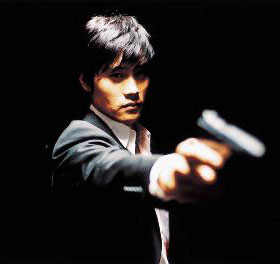 I try to avoid too much hype whenever I can help it, which is no easy feat in this gig. Whether succumbing to it myself from advanced buzz or dispensing it here on the site through various recommendations… either way it tends to lead to a degree of disappointment for somebody.
I try to avoid too much hype whenever I can help it, which is no easy feat in this gig. Whether succumbing to it myself from advanced buzz or dispensing it here on the site through various recommendations… either way it tends to lead to a degree of disappointment for somebody.
With the Korean movie A Bittersweet Life, I’d only heard that it was an outstanding new gangster flick from Ji-woon Kim, the director of the wrestling comedy The Foul King and the spook story A Tale of Two Sisters (which I previously covered HERE). The story is simple enough: gentlemanly Sun-woo (Lee Byung Hun of JSA) is the chief enforcer for Mr. Kang, a powerful crime lord. Kang suspects that his young mistress Hee-soo (the gorgeous Shin Min-a of Volcano High) is cheating on him, and assigns Sun-woo to follow her while he’s out of town and to call if his doubts are correct… which they are.
But something else has happened. The reticent Sun-woo isn’t ordinarily the type to be affected by emotion, but he yields to it just this once, because simply watching Hee-soo has awakened an unspoken appreciation for beauty and made him suddenly cognizant of his stark, solitary lifestyle. Upon discovering the expected affair Sun-woo opts not to contact his boss with the revelation, knowing full well Mr. Kang’s instructions would be to exterminate the lovers. Kang is contending with other gang relation issues instigated by Sun-woo and when the news that he ignored orders ultimately arrives, Kang decides to make an example of his former right-hand man by having his henchmen put him down. But Sun-woo escapes (in a vicious demonstration of the abilities that obviously made him such a valuable asset) and, too blunt to fully comprehend Kang’s ambiguous motivations and too stubborn to let matters slide, his existence is reduced to a single purpose: pure bloody revenge.
And now, the dispensing of the hype: A Bittersweet Life is a fantastic (if not wholly original) film noir that’s somehow both superstylish yet minimalist, part Point Blank, Peckinpah, Woo and Melville filtered through a distinct (and yet uniquely Korean) vision. Darkly poetic, the film constantly juggles clichés so they land in unanticipated ways. It’s not a traditional love story – Hee-soo is merely a catalyst for emotions that have become practically alien to Sun-woo. With his angular handsomeness and measured fury, Lee Byung Hun balances Sun-woo’s preternatural physicality with a dignified vulnerability. In fact, Sun-woo has relied solely on his “interpersonal” skills in his vocation, so when he finally acquires some guns (in one of the film’s most effective moments of black comedy) he has all the marksmanship of an Imperial Stormtrooper, awkwardly brandishing firearms as if half-expecting them to detonate in his hand. The film’s punctuations of vivid violence are kept realistically raw thanks to actor/stuntman/fight choreographer Jung Doo-Hong, who’s done similarly astonishing work on Taegukgi, Arahan, Natural City and several other films – the prolonged scene where Sun-woo brawls through a crew of thugs using whatever means available is a masterful orchestration of carnage.
Kim’s film is immaculate from the score to the supporting cast to the production design, and there are numerous layers in the disarmingly straightforward premise, implicit in the relationships and communication – Kang views the perceived infatuation and sudden unreliability in gang affairs as disrespectful and an immediate threat to his authority; Sun-woo can’t understand how seven years of absolute loyalty could be discarded so frivolously for a single independent decision, or that his brief display of emotion is only a gateway to further weakness in his chosen profession. But then, if they cleared up their misunderstandings, we wouldn’t have all that beautiful bloodshed.
![]()
Got an interesting film suggestion? Know of something good in the works? Make an independent film and want to expose yourself? Just want to tell me I’m rubbish? Drop me a line at dave@chud.com.